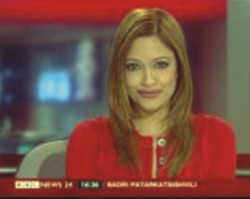|
Interview
Breaking the Myth
 |
Tasmin Lucia Khan |
A delegation of young British-Bangladeshi professionals toured Bangladesh recently in order to remove misconceptions about them. It is commonly believed Bangladeshis living in the UK mostly work in restaurants and do menial jobs. This young vibrant group of young Britons came to have dialogues with the young generation of this country and change the existing impressions about Bangladeshi Diaspora in UK. Among them were entrepreneurs who owned super store chains, teachers, member of the national sports council and a TV presenter. JACKIE KABIR spoke to Tasmin Lucia Khan - a well-known news presenter for BBC Three in London. Tasmin began her career by working for Z TV network. Later she worked as a correspondent of PTV, covering UK's biggest stories to world wide Asian Audience. Before joining BBC she also worked for Channel Five producing and presenting a sports programme.
What is the purpose of this visit?
We are visiting Bangladesh to have dialogues with young Bengalis to change the misconception about Bangladeshis being ill-treated in the UK. We've come here to meet people and tell them Bangladeshis in Britain are no longer only restaurant workers. Another reason is that I feel for the country of my origin. I've visited Bangladesh thrice in recent years. While the people living in the UK usually want to have holidays in other countries, I visit to Bangladesh to meet more Bangladeshis.
What changes do you see?
Bangladesh has improved dramatically over the last decade. The infrastructure has developed a lot. But what we need is to take Bangladesh further up. The Prime Minister has declared that she wants a digital Bangladesh by 2021. It's possible to go digital much earlier than that. We want Bangladeshi children to have better communication skills; we want uninterrupted electric supply so that investors can find Bangladesh a lucrative destination like our neighbour India which has developed tremendously due to its ICT industry. I believe Bangladesh has tremendous potential and can go a long way.
We know a large number of Bangladeshis are living in the UK. How do you think they are different if they are from other Diasporas?
The Bangladeshi community in Britain is a tightly knit community. Imagine there are about 600,000 of us living in the main towns like London, Manchester and Birmingham. According to recent statistics, the Bangladeshi community has contributed 3.5 billion pound to British economy. British-Bangladeshis are quite prominent on the UK social map.
What do you really call yourself? A British or a Bangladeshi?
I would call myself a British-Bangladeshi Muslim. You see Britain gives me the freedom of retaining my identity. I am a Muslim and am allowed to pray or wear a hijab. And if anyone is not allowed to do so then they can be questioned. There have been many incidences of establishing one's right with the help of law. So that's the kind of freedom we enjoy in Britain.
What do you think is the future of Islam in the UK?
There are about 1500 mosques in the UK. There are well above two million Muslims in the UK. These figures are enough to show how Islam is practiced there. When you walk past East London mosque you can hear the azaan and I think it is beautiful. The Muslims in the UK are 'informed Muslims' which means they first learnt about the religion and then started practicing it. So we would like to see more of these people. If you just memorise the Quran and recite the surahs, you wouldn't know what it means. You know as I have got a very modern and contemporary look, my English friends ask me about our prayers. If I don't know what it means how can I tell them about it? For me every Muslim is an ambassador for her religion. That's why each Muslim should be an ambassador to their communities. That is what Islam is all about. I was taught about my religion by the famous singer Cat Stevens who converted to Islam and came known as Yusuf Islam and subsequently became a philanthropist and Islamic educator. I think the future of Islam in UK is pretty positive.
Copyright
(R) thedailystar.net 2009 |
